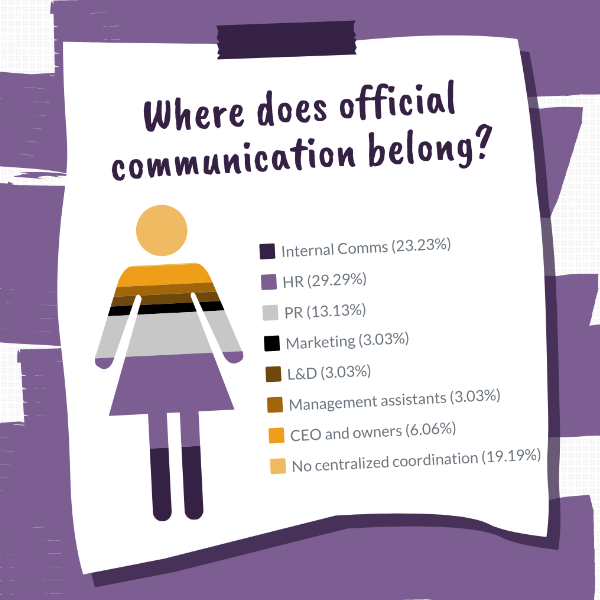If you ask ten friends who is responsible for internal comms in their company, you may easily get ten different answers. Our recent survey among Czech companies proves that the answer to the question “Where does internal comms belong within the company structure?” still isn’t an easy one to answer.
In case of our survey, 29 % of the companies placed internal comms (IC) activities with HR. 23 % have a separate team solely focused on internal comms. You can see in the graph below just how dispersed the responsibility is.

Not only Czech companies struggle when it comes to placing internal comms within the company structure. Some international scholars and managers believe it belongs to HR. Others argue that there is only one communication and as employees are just a different audience, it should be handled by the PR or Marketing team. There is also a growing number of companies who solved this problem once and for all by creating a team or a position of Corporate Comms.
In a study conducted by Karian and Box, 54 % of respondents think there should be a dedicated team taking care of internal comms. The remainder would put in charge either HR or PR. However, when the same respondents were asked whether HR is less capable to deliver internal communication, more than half (52 %) agreed. On the other hand, 33% of respondents think that internal communication is taken more seriously by HR and that HR puts it higher on its priority list compared to PR.
So, is there any correct answer?
Opinion 1: HR should own Internal Comms
In her article, Katlin Walters lists a number of common arguments why IC falls under HR. We want to highlight two of them as we have met them in a number of Czech companies.
- HR is close to employees – According to Walters, many managers assume that employees are used to seeking help from HR. Therefore, it seems natural to let HR take care of any communication concerning employees.
- That’s the way it has always been – In many companies an official internal comms strategy is missing. Management expects HR to take care of any internal announcements and HR somehow accepts it. And as Kalin Walters points out, in many cases the only strategy is “If it ain’t broken, don’t fix it.”
It seems that putting IC on HR shoulders is more of a historical pattern. “10 to 20 years ago internal comms staff were often part of the personnel department. There was then a trend for IC to sit in the corporate communications department, and the links with public relations and marketing were emphasized. More recently, there has been movement back into the HR department because these disciplines need to be coordinated and focused on engaging staff effectively,“ says Paul Brasington, chairman of the Association of Communicators in Business in an article for HR Magazine.
Opinion 2: Internal comms falls under PR
According to Allen Mireles strategic internal comms is impacted by many of the same trends that impact public relations as a whole. That’s why these areas belong together. She even uses the term “PR´s internal communications” and connects PR and internal comms as being two aspects of the same function.
You can see the connection of PR and internal comms on many marketing and PR agencies´ websites. The argument is in a nutshell – same work, same strategies, different audience.
In PR Week Annie Hayes explains to PR professionals why it’s wise to consider a career in internal comms and starts her article with the sentence: “Internal communications is no longer the poor relation of PR and marketing.”
Many companies share the same outlook as Allen Mireles and Annie Hayes, and look at internal comms as being similar to external comms, just talking to the internal audience.
Opinion 3: Internal Comms belongs to all
In a blog post for Smarp Peter Banerjea states that internal communication is a company-wide effort and therefore belongs to top management, HR, and team managers. He believes that: “Different groups within a company are responsible for different aspects of internal communication.” To him, internal communication is more of a task and a skill than a function. Therefore, more or less everyone in a company should somehow participate in it.
Liam FitzPatrick and Klavs Valskov (2014) partly support this point of view and argue that nowadays internal communication should be “the concern of everyone in a leadership role”.
The results of our survey show that many companies have the same setup. Respondents wrote that internal comms belongs to everyone, yet to no one in particular. Some information is shared by HR, some by managers, and some by teams. And communicating is rather a matter of choice than a strategically managed process.
Opinion 4: There must be a dedicated person or team
In just a couple of minutes you can google out articles with titles such as 5 Reasons You Need an Internal Communications Specialist. The main arguments of defenders of this approach are:
- Internal comms is not just a company magazine anymore. It’s a complex area that requires knowledge of communication, creative writing, marketing, psychology, HR, IT, research, leadership, and many other fields. And you need to have an expert to do it right.
- Internal comms people are partners to other teams. They don’t take sides and are able to combine both managerial point of view and employee point of view.
- Internal comms specialist or team is dedicated just to communication. They keep information flowing no matter if the CEO has time and energy to write an email to the staff or if HR has the capacity to inform employees about changes.
And poorly managed internal comms can cost you quite a lot of money. In his survey, The Cost of Poor Communication David Grossman cited companies that are on average losing 62.4 million dollars per year because of inadequate communication to and between employees.
Well, just that number can be a really good reason why to hire an internal comms professional.
Opinion 5: Employee Comms belongs to HR, Internal Comms to PR
Neither academics nor businessmen have reached any kind of conclusion. And to make it even more confusing in his article for Forbes Michael Collins adds: “I believe there is a difference in employee communications and internal communications.”
Collins argues that employee communications is just one part of a bigger function called internal communications. As employee comms includes information about hiring, recruiting, employment policies, benefits, according to Collins it belongs to HR.
However, it should be overseen or supported by a comms team taking care of both internal and external communication.
There is no right or wrong answer
Although there isn’t any straightforward conclusion, all the studies and articles agree on one thing – it doesn’t matter where internal comms sits as long as it’s well defined and incorporated into the company strategy.
As FitzPatrick and Valskov point out in their book Internal Communications: A Manual for Practitioners: “The fact is that internal communication happens regardless of where the central team is based.”




